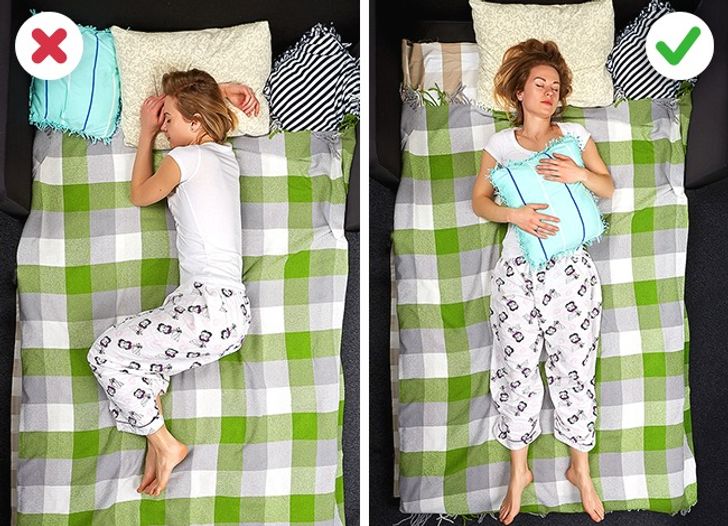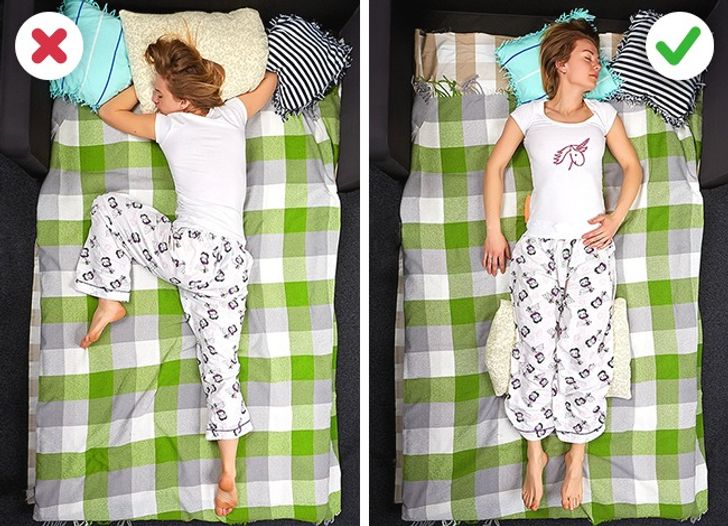We spend about a third of our lives sleeping. Both the quality of our night’s rest and our health in general depend directly on our sleeping posture and what we do before going to bed.
We have compiled recommendations from leading experts on how to sleep properly to solve all your health problems.
Best Sleeping Position for Better Sleep and Health
Shoulder Pain

If you wake up with shoulder pain, avoid sleeping on your side, especially on your painful shoulder. It is also not advisable to sleep on your stomach as it causes a misalignment of the shoulders.
The best sleeping posture is to lie on your back. Place a thin pillow (an orthopedic pillow will be best for you) under your head.
Take another pillow, place it on your stomach, and hug it. Your shoulders will now be in the correct and stable position.
If you don’t like sleeping on your back, try lying on the side that doesn’t hurt. Raise your legs slightly toward your chest and place a pillow between your knees.
It is not advisable to sleep with the hand under the head, as it produces an unnatural position of the shoulders.
Sources: daily health, home remedies for you, mayoclinic
Back Pain

If you have back pain, it is very important to maintain the normal curves of the spine. If your mattress is too soft, it is time to buy a new one.
Sleeping on your back is probably the best position for you. Place a pillow under the knees to help restore the natural curves of the spine and reduce tension on the tendons. You can also try a small towel wrapped under your lower back for additional support.
If you sleep on your stomach, put a pillow under your abdomen and pelvis so that your lower back does not move forward.
If you like to sleep on your side, it is best to stay in the fetal position. Raise your legs slightly toward your chest, keeping your back naturally arched.
Place a small pillow between your knees. This can help ease the load on your lower back.
Sources: mayoclinic, sleepfoundation
Neck Pain

As with back pain, your neck needs support while you sleep.
In general, sleeping on your back with a pillow under your head and another under each arm is the best option. People with neck problems should choose their pillows very carefully, and it is better to choose orthopedic or rolling pillows.
If you prefer to sleep on your side, make sure the pillow is not too high. It should be no more than 6 inches thick.
Ideally, the height of the pillow matches the width of one shoulder to help keep the neck in the correct position.
If you fall asleep on your stomach, use the thinnest pillow you can find. It is best not to sleep in this position, as lying down all night with your head to one side can cause neck strain.
Sources: Journal of Pain Research, Spine Health
Can’t Fall Asleep

It can be difficult to banish phones and computers before bed, but you should. It really helps if you have trouble falling asleep. The light from the screens affects our sleep and wake cycles.
Avoid consuming caffeine (coffee, energy drinks, soda, black tea, chocolate) at least 6 hours before bedtime.
Exercise in the morning and afternoon. This helps tone your entire body, improves blood circulation, and helps you fall asleep much faster.
Sources: Journal of Applied Physiology, Neuroendocrinology Letters
Can’t Stay Asleep

If you usually wake up in the middle of the night, not only should you stop using your devices before going to bed, but you should also avoid alcohol before going to bed. Alcohol disrupts the water balance in your body and affects your sleep cycle.
Also, check the ambient temperature. The ideal temperature for sleeping is 20-22 ° С.
Sources: National Institute on Alcohol Abuse, Sleep Foundation, Sciencedirect
Other problems
Sleep disorders can be caused by many factors, from fatigue and uncomfortable shoes to problems with the digestive or nervous system. Only a doctor can determine the cause of the problem and advise on treatment.
If you suffer from frequent heartburn, it is a good idea to lie on your left side while lifting a few zs. The sleeping position on the left side prevents stomach contents from flowing back into the esophagus, preventing heartburn.
Do your legs hurt at night? Use a rolled pillow or footboard to keep your legs up while you sleep. Venous blood accumulated in your legs will drain and you will feel better.
Also, try rubbing or lightly massaging your legs before bed and avoid consuming caffeine for at least 6 hours before bed.
Sources: Cleveland Clinic, Healthline, Сlevelandclinic
Based on materials from thisisinsider


